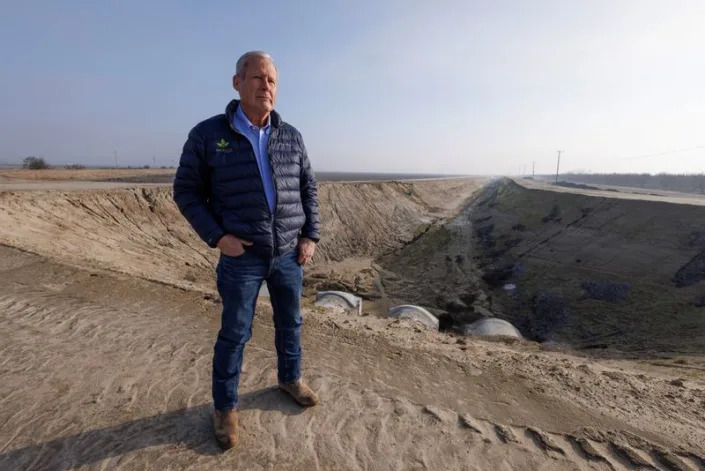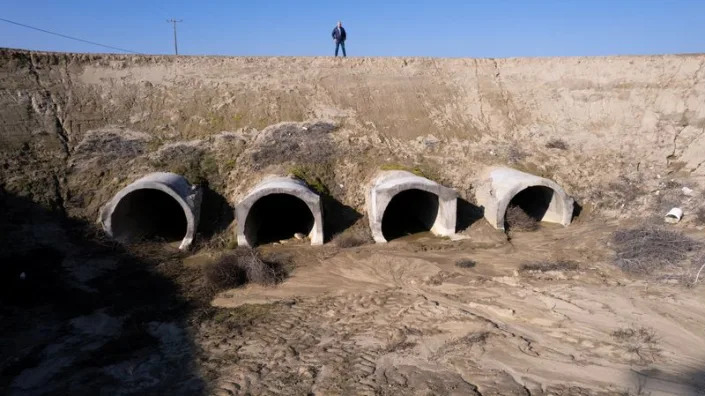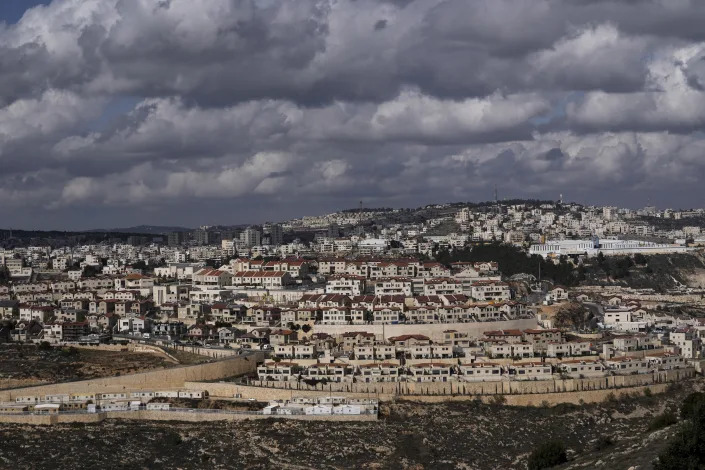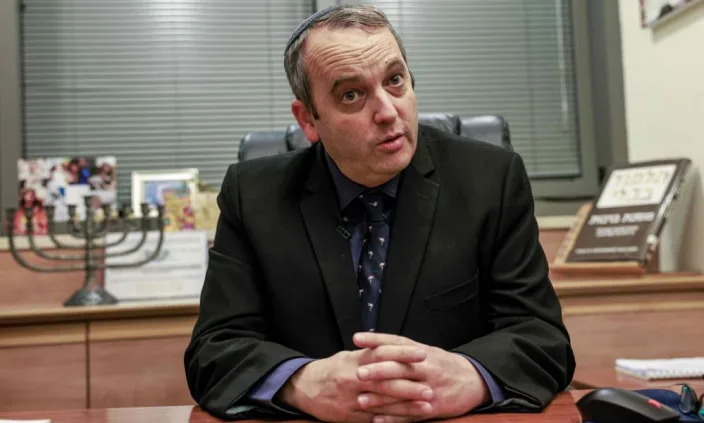PAGANS HAVE NO SUCH QALMS
‘Green’ burial alternatives, human composting get a hard ‘no’ from Catholic bishopsNATURE IS SACRED

Christine Rousselle
Fri, March 24, 2023
A large faith conference is pushing back on "green composting" as a way to handle human remains.
It is improper to compost human remains and the practice is disrespectful to the body of the deceased, the United States Conference of Catholic Bishops said in a statement released Thursday, March 23.
"The guidance offered by the Congregation regarding burial and cremation reflects the Church’s overarching concern that due respect be shown to the bodily remains of the deceased in a way that gives visible witness to our faith and hope in the resurrection of the body," said the statement, authored by the conference's doctrine committee.
"Unfortunately, the two most prominent newer methods for disposition of bodily remains that are proposed as alternatives to burial and cremation, alkaline hydrolysis and human composting, fail to meet this criterion," the group added.
NEW YORK BECOMES THE 6TH US STATE TO GREEN LIGHT HUMAN COMPOSTING LAW
In 2019, Washington became the first state to legalize human composting.
Since then, Colorado, Oregon, Vermont, California and New York have also legalized the practice, according to Smithsonian magazine.
A 2022 survey from the National Funeral Directors Association found that 60.5% would be interested in "green" funeral options — an increase from 55.7% the prior year.

Guests sit in the gathering space looking at a shrouded mannequin in front of the threshold vessel at Recompose, a green funeral home specializing in human composting, on Oct. 6, 2022 in Seattle, Washington.
It is believed that the cost of traditional funerals as well as the chemicals required for embalming are leading some to consider this option.
The bishops took issue with what happens to the human body after undergoing human composting or alkaline hydrolysis.
As opposed to cremation, where "all human remains are gathered together and reserved for disposition," alkaline hydrolysis and composting require that the remains be essentially scattered, they said.
‘HUMAN COMPOSTING’ ON THE RISE AS ‘GREEN FUNERALS’ BECOME INCREASINGLY POPULAR
"After the alkaline hydrolysis process, there are also remnants of the bones that can be pulverized and placed in an urn. That is not all that remains, however," they said in the statement.
Alkaline hydrolysis also produces "100 gallons of brown liquid" that was formerly human remains.

Human remains should be buried — either in a casket or in an urn — in a sacred place such as a cemetery, said the Catholic bishops.
"This liquid is treated as wastewater and poured down the drain into the sewer system (in certain cases it is treated as fertilizer and spread over a field or forest)," something that "does not show adequate respect for the human body, nor express hope in the resurrection," said the bishops.
The same is true for human composting, which leads "nothing left but compost, nothing that one can point to and identify as remains of the body."
The conference statement added, "The body and the plant material have all decomposed together to yield a single mass of compost. What is left is approximately a cubic yard of compost that one is invited to spread on a lawn or in a garden or in some wilderness location" — something that the bishops say "is not sufficiently respectful of the human body."

Human composting reduces the human body to soil, as seen above. Human composting is also known as natural organic reduction, terramation or recomposition.
"The body is completely disintegrated," said the bishops.
"There is nothing distinguishably left of the body to be placed in a casket or an urn and laid to rest in a sacred place where Christian faithful can visit for prayer and remembrance."
In the Catholic Church, burial is considered "the most appropriate way of manifesting reverence and respect for the body of the deceased."
It also "clearly expresses our faith and hope in the resurrection of the body."
While cremation is permitted as long as it is not "chosen for reasons contrary to Christian doctrine," said the bishops, it is not permissible to scatter the ashes of the deceased, divide them among family members and friends, or store them in a home.

While cremation is considered an acceptable option, the container of the remains must be buried in a sacred place and not scattered, said the United States Conference of Catholic Bishops.
Cremated remains "must be put in a sacred place, usually a cemetery, though it could possibly be a church or some other area that has been 'set aside for this purpose, and so dedicated by the competent ecclesial authority,'" noted the bishops.
Doing this "shows our respect for the last remains of the deceased and manifests our Christian hope in the resurrection of the body," they also said.
"The relationship between the living and the dead is not a purely private matter, but rather involves the entire Christian community," said the bishops.
With traditional burials, as well as burying ashes in a "sacred place," it is ensured that "those who died will not be deprived of the prayers and remembrance of their families and of the Christian community as a whole," they also noted.
"The Church earnestly recommends visits to cemeteries to pray for the dead, which is one of the spiritual works of mercy," the bishops added.

Christine Rousselle
Fri, March 24, 2023
A large faith conference is pushing back on "green composting" as a way to handle human remains.
It is improper to compost human remains and the practice is disrespectful to the body of the deceased, the United States Conference of Catholic Bishops said in a statement released Thursday, March 23.
"The guidance offered by the Congregation regarding burial and cremation reflects the Church’s overarching concern that due respect be shown to the bodily remains of the deceased in a way that gives visible witness to our faith and hope in the resurrection of the body," said the statement, authored by the conference's doctrine committee.
"Unfortunately, the two most prominent newer methods for disposition of bodily remains that are proposed as alternatives to burial and cremation, alkaline hydrolysis and human composting, fail to meet this criterion," the group added.
NEW YORK BECOMES THE 6TH US STATE TO GREEN LIGHT HUMAN COMPOSTING LAW
In 2019, Washington became the first state to legalize human composting.
Since then, Colorado, Oregon, Vermont, California and New York have also legalized the practice, according to Smithsonian magazine.
A 2022 survey from the National Funeral Directors Association found that 60.5% would be interested in "green" funeral options — an increase from 55.7% the prior year.

Guests sit in the gathering space looking at a shrouded mannequin in front of the threshold vessel at Recompose, a green funeral home specializing in human composting, on Oct. 6, 2022 in Seattle, Washington.
It is believed that the cost of traditional funerals as well as the chemicals required for embalming are leading some to consider this option.
The bishops took issue with what happens to the human body after undergoing human composting or alkaline hydrolysis.
As opposed to cremation, where "all human remains are gathered together and reserved for disposition," alkaline hydrolysis and composting require that the remains be essentially scattered, they said.
‘HUMAN COMPOSTING’ ON THE RISE AS ‘GREEN FUNERALS’ BECOME INCREASINGLY POPULAR
"After the alkaline hydrolysis process, there are also remnants of the bones that can be pulverized and placed in an urn. That is not all that remains, however," they said in the statement.
Alkaline hydrolysis also produces "100 gallons of brown liquid" that was formerly human remains.

Human remains should be buried — either in a casket or in an urn — in a sacred place such as a cemetery, said the Catholic bishops.
"This liquid is treated as wastewater and poured down the drain into the sewer system (in certain cases it is treated as fertilizer and spread over a field or forest)," something that "does not show adequate respect for the human body, nor express hope in the resurrection," said the bishops.
The same is true for human composting, which leads "nothing left but compost, nothing that one can point to and identify as remains of the body."
The conference statement added, "The body and the plant material have all decomposed together to yield a single mass of compost. What is left is approximately a cubic yard of compost that one is invited to spread on a lawn or in a garden or in some wilderness location" — something that the bishops say "is not sufficiently respectful of the human body."

Human composting reduces the human body to soil, as seen above. Human composting is also known as natural organic reduction, terramation or recomposition.
"The body is completely disintegrated," said the bishops.
"There is nothing distinguishably left of the body to be placed in a casket or an urn and laid to rest in a sacred place where Christian faithful can visit for prayer and remembrance."
In the Catholic Church, burial is considered "the most appropriate way of manifesting reverence and respect for the body of the deceased."
It also "clearly expresses our faith and hope in the resurrection of the body."
While cremation is permitted as long as it is not "chosen for reasons contrary to Christian doctrine," said the bishops, it is not permissible to scatter the ashes of the deceased, divide them among family members and friends, or store them in a home.

While cremation is considered an acceptable option, the container of the remains must be buried in a sacred place and not scattered, said the United States Conference of Catholic Bishops.
Cremated remains "must be put in a sacred place, usually a cemetery, though it could possibly be a church or some other area that has been 'set aside for this purpose, and so dedicated by the competent ecclesial authority,'" noted the bishops.
Doing this "shows our respect for the last remains of the deceased and manifests our Christian hope in the resurrection of the body," they also said.
"The relationship between the living and the dead is not a purely private matter, but rather involves the entire Christian community," said the bishops.
With traditional burials, as well as burying ashes in a "sacred place," it is ensured that "those who died will not be deprived of the prayers and remembrance of their families and of the Christian community as a whole," they also noted.
"The Church earnestly recommends visits to cemeteries to pray for the dead, which is one of the spiritual works of mercy," the bishops added.





















